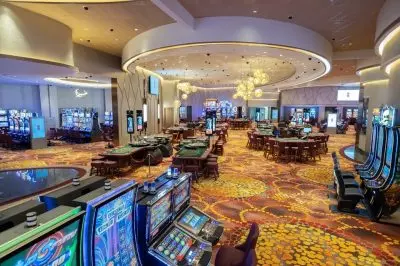 Yesterday, Cyprus’ Gaming and Casino Supervision Commission revealed that the three casinos in the country had attracted around 470,000 visitors by the end of January 2019. The amount spent by them was estimated at €210 million.
Yesterday, Cyprus’ Gaming and Casino Supervision Commission revealed that the three casinos in the country had attracted around 470,000 visitors by the end of January 2019. The amount spent by them was estimated at €210 million.
According to data provided by Christos Mavrellis, the chairman of the Commission, the majority of gamblers who visited the casinos – about 80% – were local residents. The three casinos were also visited by many visitors from other countries, and by Greeks as well.
As revealed by the Gaming and Casino Supervision Commission to the House ethics committee, an overall amount of €175 million was returned to gamblers in the form of winnings in the period from June 2018 to January 2019. The revenue received by the gambling operator in the same period of time amounted to €35 million, with €5.25 million paid out by the company in state tax. Mr. Mavrellis, further explained that an additional €4 million were paid as license fees to Cyprus competent authorities.
The first Cyprus casino started operation in Limassol in June 2018. Half a year later, in December, it was followed by two other gambling venues situated in Larnaca and Nicosia. For the time being, the staff at the three casinos mostly consists of local people.
Mavrellis Turns Down MPs’ Concerns with Gambling-Related Harm Risks
 After the head of the country’s Gaming and Casino Supervision Commission provided the details regarding the number of tourists who visited Cyprus’ three casinos, some MPs suggested that the establishments have not attracted the expected number of visitors so far.
After the head of the country’s Gaming and Casino Supervision Commission provided the details regarding the number of tourists who visited Cyprus’ three casinos, some MPs suggested that the establishments have not attracted the expected number of visitors so far.
Mr. Mavrellis explained that 300,000 more tourists were expected on an annual basis when the Limassol-based casino resort starts operation in 2021. He further noted that a tour operator interested in bringing foreign gamblers to the country has already approached the Commission. According to expectations, such request would probably become more frequent when the €550-million gambling venue came closer to completion.
Some MPs have suggested that the opening of the casino could boost the risks of problem gambling, but the Commission’s chair explained that gambling addictions could be unlocked by other forms of gambling, too, especially the ones that are widely accessible across the country. Mr. Mavrellis shared that problem gamblers whose compulsive gambling habit had affected their families were suspended from entering the casino, and the venue’s staff is instructed to monitor players at certain intervals of time depending on the amounts of money they spend.
Furthermore, some MPs shared their fears that the casino in Nicosia is situated in close proximity to a local university department and could have a detrimental impact on students. The Commission’s chair, however, explained that the casino operation hours started at 3:00 PM when students’ classes finished and customers must be over 21 years of age to be allowed to enter the casino. Mr. Mavrellis also revealed that more than 200 individuals had not been allowed to enter because they had no ID.